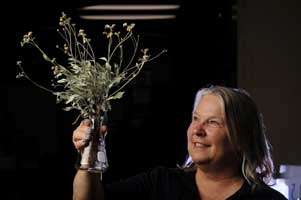 Tyre maker Bridgestone Americas Inc. has teamed up with University of Arizona in a five-year, US$70 million effort to scale up production of natural rubber from guayule. The US Department of Agriculture will channel an investment of US$35 million, with Bridgestone to top up the rest.
Tyre maker Bridgestone Americas Inc. has teamed up with University of Arizona in a five-year, US$70 million effort to scale up production of natural rubber from guayule. The US Department of Agriculture will channel an investment of US$35 million, with Bridgestone to top up the rest.
The money will mostly be used to help farmers transition to growing guayule instead of less sustainable, more water-intensive crops such as alfalfa, cotton and wheat.
Additional partners on the project include the Colorado River Indian Tribes, Colorado State University, regional growers and OpenET, a public-private partnership that facilitates responsible water management.
The perennial plant — native to the Chihuahuan Desert of northern Mexico, southern New Mexico and southwest Texas — can be grown with a fraction of the water needed for hay or cotton, and it can be harvested every two years without the need to till the soil and replant. That means less erosion and more carbon being stored in the ground instead of floating free in the atmosphere as carbon dioxide.
The desert plant can also survive interruptions in its water supply caused by drought, irrigation equipment failure or mandatory reductions like those many farmers are facing from the Central Arizona Project and elsewhere on the Colorado River system.
The US plans to gradually wean off its rubber supply from Southeast Asia, which produces most of the natural rubber globally.
Bridgestone has been working with guayule in Arizona since 2012 at the company’s 280-acre farm in Eloy, about halfway between Phoenix and Tucson. Bridgestone plans to expand the farm to 20,000 acres in the next several years by working with Native American farmers to grow guayule on tribal lands, and with other area farmers.
“Eventually, we hope to have plantings of around 100,000 acres, spread out across 15 or 20 facilities across the Southwest,” said David Dierig, section manager for agro operations at Bridgestone.
The company has said it plans to break ground next year on an industrial-scale processing facility to handle the guayule Arizona farmers could be growing under contracts with Bridgestone by 2028.
As promising as guayule is as a source of natural rubber, producing the rubber alone is not economically viable, so Kim Ogden, head of the Department of Chemical and Environmental Engineering, is working to find additional products that could be derived from guayule and marketed to supplement the revenues from manufacturing rubber products.
In addition to a rubber content of about 5%, guayule also has a resin content of 7% to 9%, which could be used to make natural adhesives and insect repellents. The rest of the plant is woody biomass that could be converted into biofuel or used to make particle board.
Though the guayule industry is still in its infancy, the domestic rubber is already popping up in some interesting places. Bridgestone recently released a new Firestone racing tire, Firehawk, that contains guayule rubber. The tyres, sporting distinctive lime green accents on the sidewalls, debuted as part of the IndyCar circuit races during the Pit Stop Challenge last year, as well as the Big Machine Music City Grand Prix in Nashville.
After last year’s successful run, the tyres are being used in IndyCar’s five street-circuit races this season.
